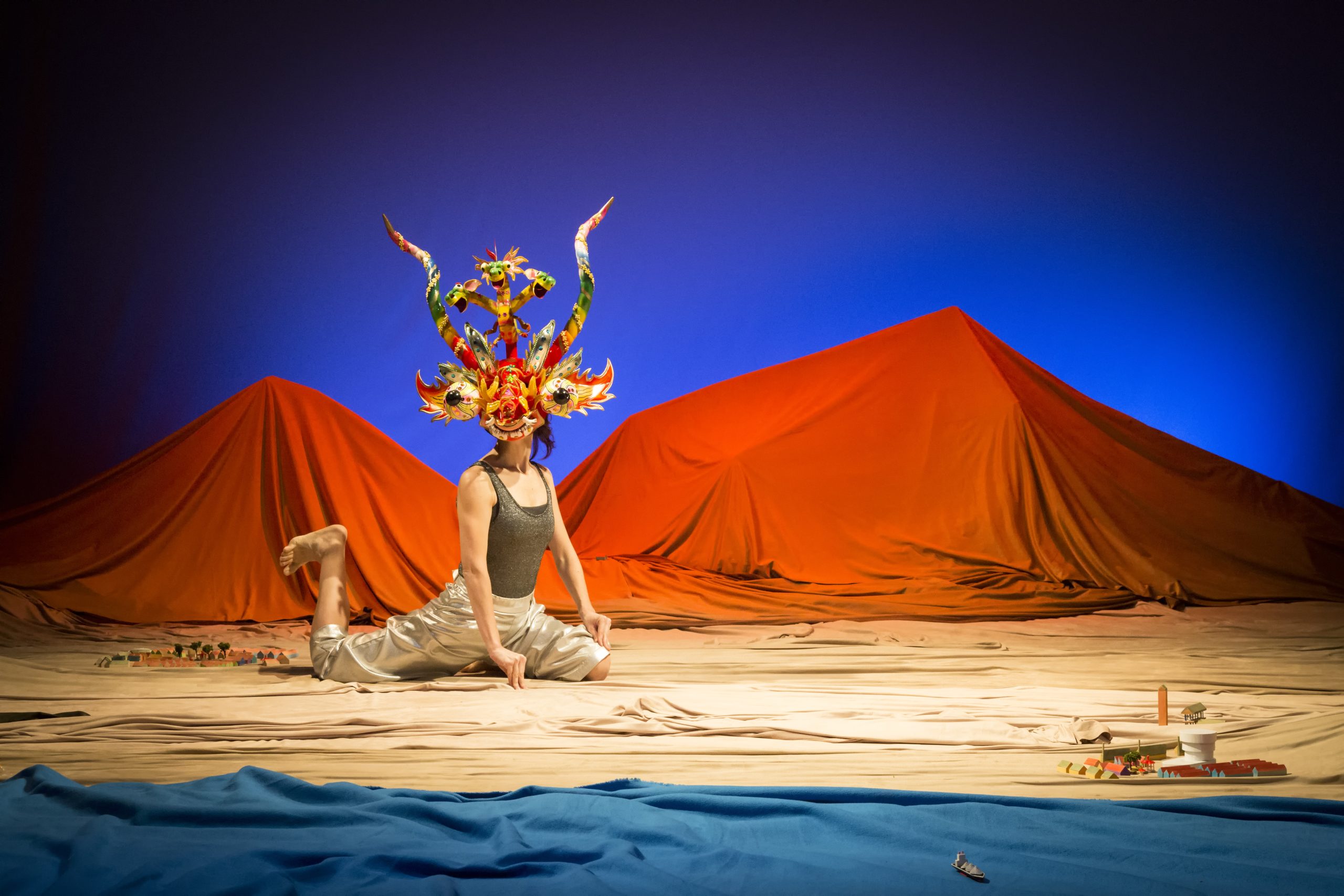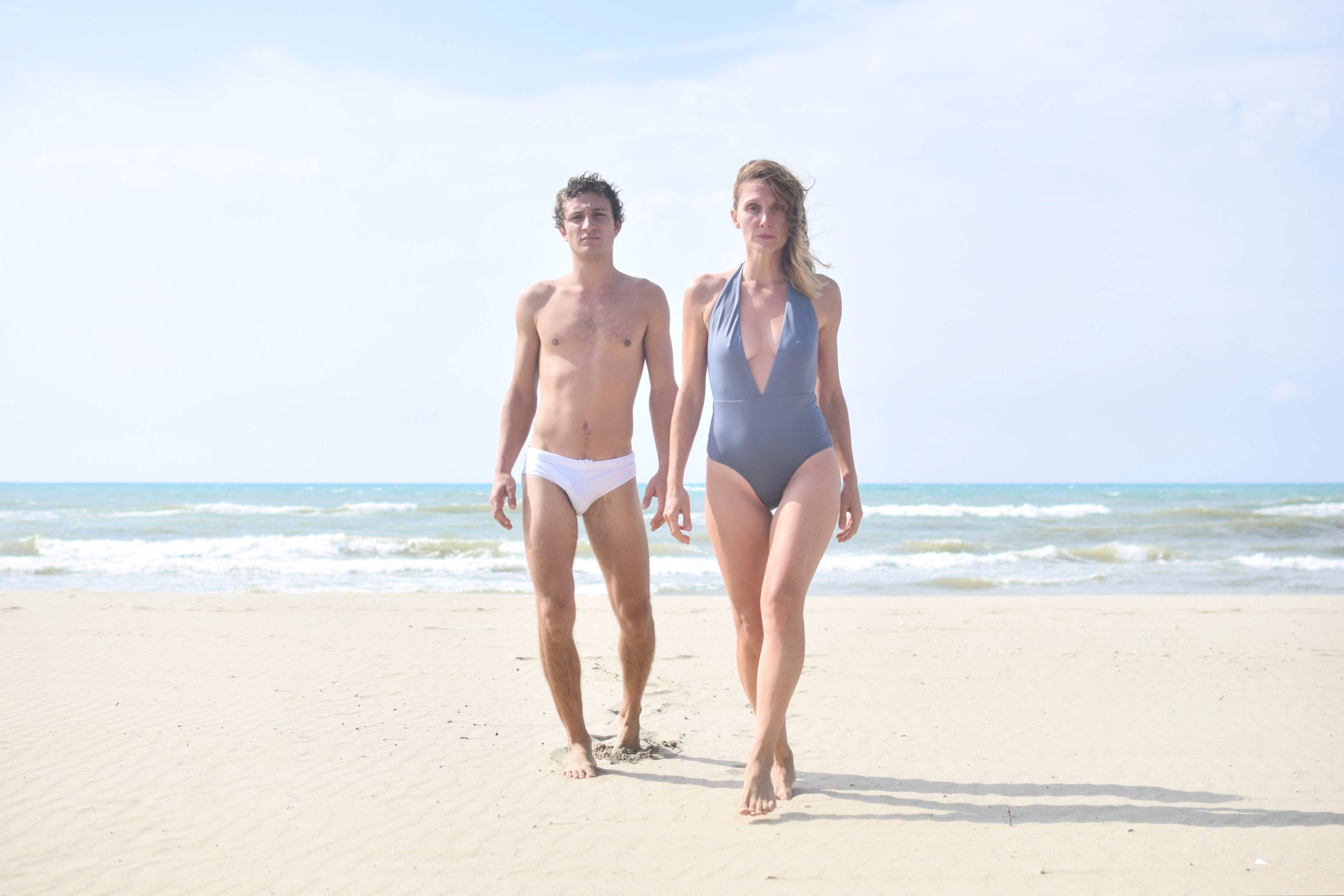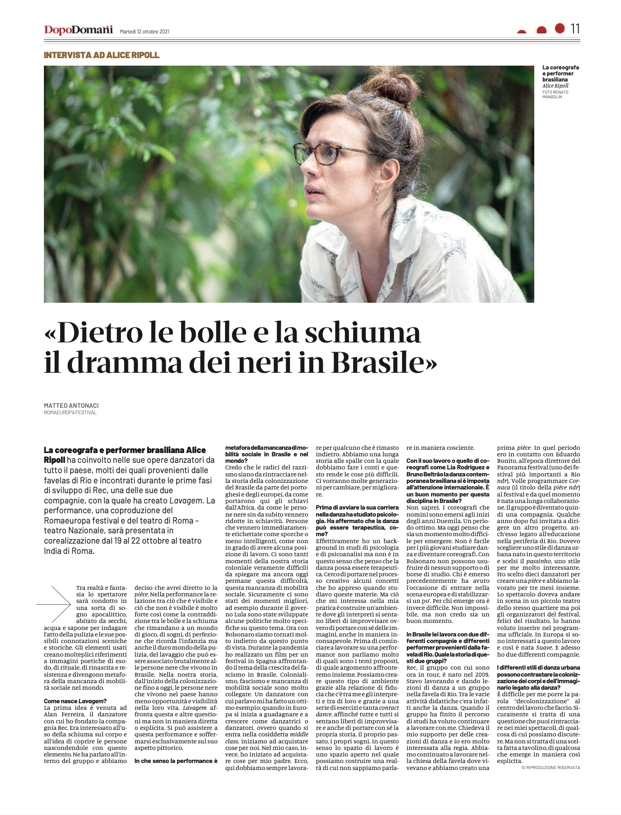ITA/ENG
Nutrirsi di storie, immagini, esperienze, ribaltare le narrazioni dominanti per costruire nuove strade dedicate allŌĆÖimmaginazione e alla convivenza. La sesta settimana del REf21 continua a far emergere i motivi e le visioni che guidano il festival da trentasei anni e ci porta lontano dallŌĆÖEuropa per guardare da altre prospettive la Storia e il modo in cui ├© tramandata.
Arriva dal brasile per presentare in prima nazionale il suo Lavagem (per una corealizzazione tra Romaeuropa e Teatro di Roma ŌĆō Teatro Nazionale) la coreografa Alice Ripoll in scena al Teatro India dal 19 al 22 ottobre. Sei danzatori in scena per indagare tra secchi dŌĆÖacqua, sapone e schiuma lŌĆÖatto della pulizia con le sue possibili connotazioni sceniche e storiche e generare attraverso la danza immagini poetiche di esodo, rituale, rinascita e resistenza. Ma nella fragilit├Ā delle bolle di sapone, sotto la schiuma che copre i corpi si nasconde una critica alla societ├Ā brasiliana, allŌĆÖemarginazione dei neri in brasile, alla mancanza di mobilit├Ā sociale. ┬½Cosa deve essere effettivamente pulito?┬╗ racconta la coreografa, ┬½Le case, lo sporco dentro le stanze? Le tracce lasciate, i fatti storici? La schiuma di sapone colora i corpi e allude allŌĆÖinvisibilit├Ā. Le bolle suggeriscono un mondo di sogni, in netto contrasto con la grave mancanza di mobilit├Ā sociale nel mondo reale┬╗.
LEGGI LŌĆÖINTERVISTA AD ALICE RIPOLL NELLO SPECIALE DOPODOMANI ŌĆ£IL LATO OSCURO DELLA STORIA (PUOI ABBONARTI CON IL CODICE PROMOZIONALE ŌĆ£ROMAEUROPAŌĆØ E LEGGERLA QUI)
├ł un percorso nellŌĆÖAmerica Latina anche quello costruito dalla compagnia iberico-sudamericana Azkona&Toloza che torna al REf21, dopo Tierras del Sud, per concludere la Trilogia Pac├¼fico nata per indagare le conseguenze del neocolonialismo e del capitalismo in Cile, Argentina e Brasile. Un dispositivo teatrale in grado di ribaltare le narrazioni dominanti e le immagini che lŌĆÖoccidente ha prodotto per raccontare se stesso e in cui si condensa la complessit├Ā della storia sudamericana e delle sue narrazioni con lŌĆÖoccidente. Se Extra├▒os mares arden, primo capitolo di questo percorso (in scena al Mattatoio il 20 e il 21 ottobre) intreccia la storia della famiglia Guggenheim con quella del deserto di Atacama per mostrare i legami tra lŌĆÖindustria mineraria e il sistema dellŌĆÖarte contemporanea, Teatro Amazonas┬Ā(in scena sempre al Mattatoio il 23 e il 24 ottobre) ci conduce in due dei principali siti architettonici del Brasile: il Teatro dellŌĆÖopera e lo stadio di Manaus per raccontare le trasformazioni dellŌĆÖAmazzonia brasiliana tra boom industriale, cultura coloniale e indigena.
┬½Un percorso che attraversa le storie dimenticate cancellate o messe a tacere dal colonialismo, per tratteggiare una rivisitazione della storia ufficiale e scrivere una nuova storia che racconti dei vinti, dei ŌĆ£nessunoŌĆØ. La storia di coloro che siamo finiti per designare come popoli sterminati o estinti o mai esistiti, ma che, al contrario, sono rimasti saldi per secoli, difendendo la loro sapienza ancestrale e il loro modo di vedere e di ordinare il mondo. Perch├® alla fine si tratta di mettere a confronto diverse visioni di come dovrebbe essere il mondo e di capire come una di esse, il modo coloniale di fare le cose, abbia prevalso sulle altre a furia di sangue, croci, denaro e fuoco. Cancellando deliberatamente buona parte della storia comune dei popoli indigeni latinoamericani ma senza riuscire a recidere i legami che li uniscono alle terre che abitano. Come i fiumi che scorrono liberi da secoli, o le montagne eterne delle Ande che sono i loro luoghi di passaggio, i loro rifugi e i loro luoghi sacri. Fiumi e montagne costantemente minacciati dalle industrie estrattive che si moltiplicano esponenzialmente, dallŌĆÖarrivo degli imperi coloniali ai nostri giorni┬╗ racconta la compagnia.
LEGGI IL RACCONTO DI UN VIAGGIO NEL DESERTO COLONIALE DI TXALO-TOLOZA FERNAND├ēZ E LAIDA AZKONA GO├æI SU DOPODOMANI.

Ci porta su una spiaggia dalla collocazione ignota il debutto in prima assoluta del secondo capitolo ispirato alla produzione romanzesca di Yukio Mishima del regista Dante Antonelli che con Atto di Passione si lascia ispirare da alcuni dei romanzi pi├╣ controversi ed erotici dellŌĆÖautore giapponese: La scuola della carne, Trastulli di animali e Colori Proibiti. Lontano dalla trasposizione scenica dei romanzi, Antonelli ne distilla lo spirito per dare vita, con una personalissima scrittura scenica, alla storia dellŌĆÖincontro tra una donna di pi├╣ di quarantŌĆÖanni e un giovane ragazzo per un percorso a tinte noir di scoperta e repulsione della propria identit├Ā, del proprio bisogno di smarrimento e possesso, in una danza a due capace di invertire e ribaltare la direzione e le certezze della vita.

Torniamo ad incontrarci dal vivo, infine, il 20 ottobre alle ore 19 al Mattatoio, in occasione della pubblicazione del libro ŌĆ£Dialoghi con artisti di teatroŌĆØ di Chiara Pirri Valentini edito da Bulzoni. Un volume nato a partire dalla raccolta di interviste ad artiste ed artisti realizzate tra la 31esima e la 35esima edizione del Romaeuropa Festival per i programmi di sala del festival e ampliato da altri sguardi, altre voci e prospettive. Una scelta di approfondimento in forma di ??????? per analizzare i percorsi performativi e tematici che hanno attraversato il Romaeuropa Festival e che nutrono la creazione contemporanea internazionale ┬Ārestituendo un’immagine sfaccettata del nostro presente.

ENG
Feeding on stories, images, experiences, overturning the dominant narratives to build new paths dedicated to imagination and coexistence. The sixth week of REf21 continues to bring out the motifs and visions that have guided the festival for thirty-six years and takes us away from Europe to look at History and the way in which it is handed down from other perspectives.
Choreographer Alice Ripoll arrives from Brazil to present at Teatro India from October 19th to 22th the national premiere of Lavagem (in co-realization between Romaeuropa and Teatro di Roma – Teatro Nazionale). Six dancers on stage surrounded by buckets of water, soap and foam to investigate the act of cleaning with its possible scenic and historical connotations and to generate poetic images of exodus, ritual, rebirth and resistance through dance. But in the fragility of the soap bubbles, under the foam that covers the bodies, there is a criticism of Brazilian society, of the marginalization of black people in Brazil, of the lack of social mobility in the world.
“What actually needs to be cleaned?” says the choreographer, ┬½The houses, the dirt inside the rooms? The traces left, the historical facts? The soap foam colors the bodies and alludes to invisibility. The bubbles suggest a world of dreams, in stark contrast to the severe lack of social mobility in the real world┬╗. The Iberian-South American company Azkona & Toloza, returns to Ref21, after presenting of Tierras del Sud in 2020, to conclude the Trilogia Pacifico created to investigate the consequences of neo-colonialism and capitalism in Chile, Argentina, and Brazil. A theatrical machine capable of overturning the dominant narratives and images that the West has produced to tell its history and in which the complexity of South American history and its connection with the West is condensed. If the first chapter of this journey, Extra├▒os mares arden (staged at the Mattatoio on the 20th and 21st of October) intertwines the history of the Guggenheim family with that of the Atacama desert to show the links between the mining industry and the contemporary art system, Teatro Amazonas (at Mattatoio on the 23rd and 24th of October) takes us to two of the main architectural sites in Brazil, the Opera House and the Manaus stadium, to tell the transformation of the Brazilian Amazon between the industrial boom, colonial culture and indigenous culture.
┬½A journey through stories forgotten, cancelled or silenced by colonialism, to draw a retelling of official history and write a new story that tells about the losers, the ŌĆ£nobodiesŌĆØ. The history of those who we ended up labelling as exterminated, exctinted or never existed populations, but that, on the contrary, stayed strong for ages, defending their ancestral wisdom and their way of seeing and to organising the world. In the end it is all about comparing different visions of how the world should be and understanding how one of those visions, the colonial way of doing things, prevailed on others thanks to blood, crosses, money and fire. Eliminating on purpose part of the common history of the indigenous Latin-American population but without cutting off the bond that connects them to the lands they inhabit. Just like the rivers running free for centuries, or the eternal mountains of the Andes which are their passing lands, their shelters and their sacred places. Rivers and mountains constantly threatened by mining industries exponentially growing, by the arrival of nowadays colonial empires┬╗ the company tells.
The premiere debut of the second chapter inspired by the literary production of Yukio Mishima by director Dante Antonelli takes us to a beach in an unknown location. Atto di Passione is inspired by some of the most controversial and erotic novels of the Japanese author: The School of Flesh, The Frolics of the Beasts and Forbidden Colors. Far from the scenic transposition of the novels, Antonelli distills their spirit to give life, with a very personal scenic writing, to the story of the encounter between a woman over forty and a young boy for a noir-hued path of discovery and repulsion of one’s own identity, of one’s need for loss and possession. A dance capable of reversing and overturning the direction and certainties of life.
Finally, we will meet again live on the 20th of October at 7 pm at the Mattatoio, on the occasion of the publication of the book ŌĆ£Dialoghi con artisti di teatroŌĆØ by Chiara Pirri Valentini published by Bulzoni. A volume born from the collection of interviews with artists collected between the 31st and 35th edition of the Romaeuropa Festival for the festival’s evening programme and expanded by other perspectives and voices. A chance of in-depth analysis in the form of ??????? to analize the performative and thematic paths that have crossed the Romaeuropa Festival and the contemporary theatrical culture and which return a multifaceted image of our present.
















